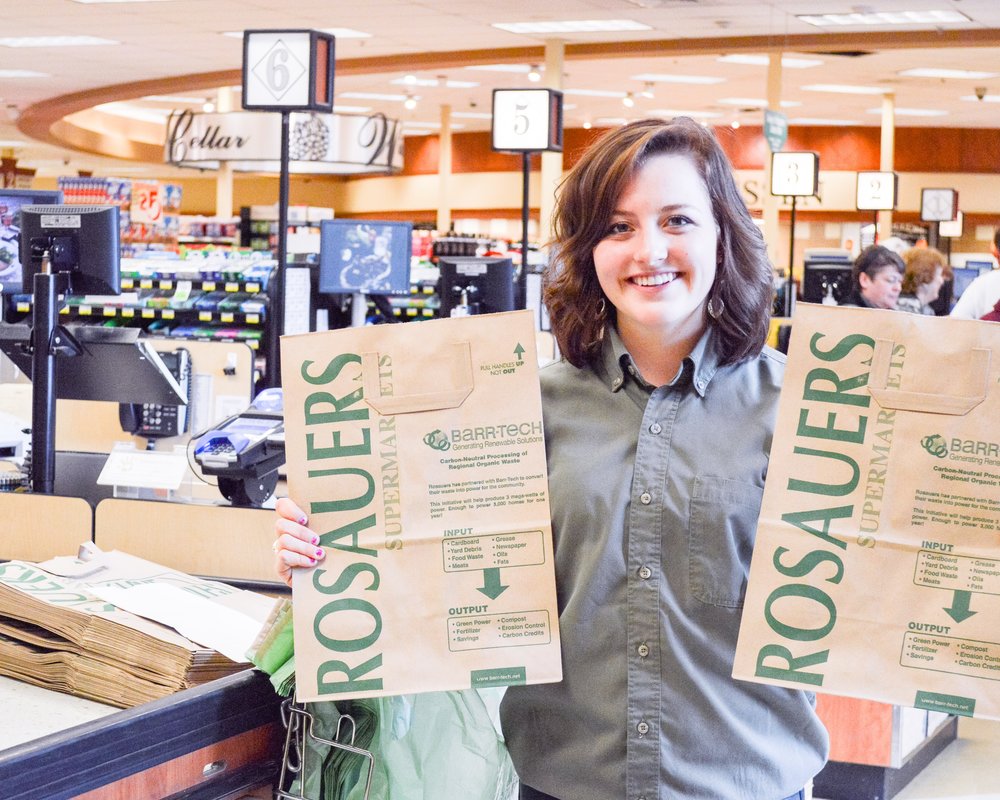by Weston Whitener
At the end of every Rosauers Supermarket checkstand, a courtesy clerk waits to put customers’ groceries into bags. But what customers do not usually see is the fierce competition that stems from this ordinary job.
“I started two years ago, just as a courtesy clerk at Rosauers,” sophomore Olivia Atkins said.
From her experience at the North Rosauers branch, Atkins launched herself into the little-known sport of competitive grocery bagging.

Fans swarmed the aisles with pom-poms and cheers at the Rosauers company competition on Oct. 5 at the U-City Rosauers. Baggers traveled from Rosauers locations in Oregon, Montana, Idaho and throughout Washington to see which clerks would represent the company at the various statewide competitions, leading up to the national Best Bagger Championship.
Organized by the National Grocers Association (NGA), the Best Bagger Championship has transformed from a local contest into a national tournament. The championship pits the best courtesy clerks against one another in a test of speed, knowledge and customer service, according to the NGA website.
The best baggers move up through a bracket, beginning at their home grocery stores, and continuing on to compete at the National Championship in Las Vegas Feb. 9-12. The national champion will earn more than $15,000 in winnings over the various competitions, according to the NGA website.
“There’s a lot of money riding on it,” Atkins said.
The baggers are judged on a variety of criteria; the clerks must fill two bags in 45 seconds while practicing correct technique and customer service, according to the Best Bagger Contest Training Manual.
While rifling through the groceries to get a competitive time, baggers must remember bag-building rules, including glass cannot touch glass, boxes cannot be put on their sides and eggs must not go on the bottom. Many other rules apply to filling a bag with groceries.
On top of these requirements, both bags must be equal in weight, despite the wide variety of items to be packed.
“If you were to look at a puzzle, you have to be able to analyze it without doing anything,” Atkins said. “If I have stuff in front of me I can analyze and automatically weigh it in my head.”
Atkins’ analysis ability, along with her speed and courtesy, earned her 29 out of 30 points in her first practice round, and after more practice she scored 29.7 points. With this talent, she beat the other clerks in her Rosauers branch, sending her to the company championship. Atkins hoped that this talent would propel her to the state contest so she could earn enough money to spend a semester abroad in London, she said.
Competition with her fellow courtesy clerks has also motivated Atkins.
“My first motivation was another courtesy clerk named Eric [Barons], who won [the company competition] last year,” Atkins said. “My competition was to beat him because he had won three years in a row. I was like, ‘Someone else needs a chance to win.’”
With two previous top-three finishes at the state level, Barons has since bowed out of the contest. This year, he spent the season helping Atkins prepare for the competition.
“I’ve been showing her techniques and little things that I’ve learned over the years that may help her do better, so it does not have to be so stressful when she gets there,” Barons said.
At the company competition, Atkins’ home branch rallied around her, hoping to bring back another trophy. Both Barons and the branch manager came with Atkins to cheer for her.
During the competition, two opponents lined up at neighboring checkstands. At the sound of a referee’s whistle, the pair of baggers hurriedly filled two paper bags, the crowd cheering and the bags rustling.
Each contestant competed in two rounds, one round included filling paper bags and the other filling reusable cloth bags. Some filled their bags with frantic haste, while others practiced methodical precision. One competitor filled two bags at once. At stake in this tier of the competition: a prize of $1,000.
Atkins finished before her opponent in both the paper and reusable bag rounds. Atkins’ branch manager timed her bagging speed from the sidelines, and said Atkins completed packing the paper bags in approximately 45 seconds and packed the more difficult reusable bags in 44 seconds. Her score, however, was not high enough to place her in the top three.
“She’s pretty much at what my score was,” Barons said. “She’s definitely a good worker.”
Contact Weston Whitener at wwhitener17@my.whitworth.edu
